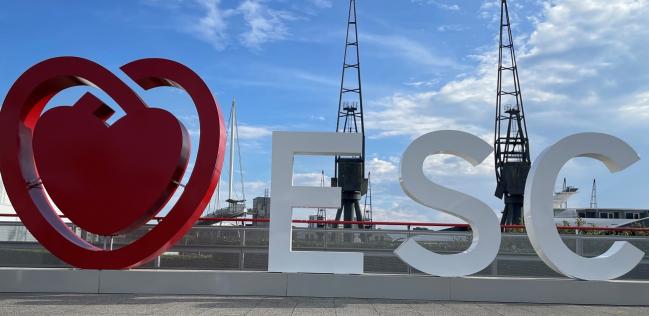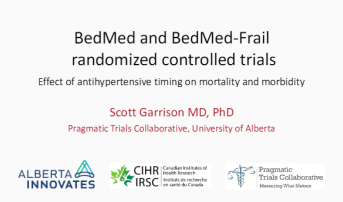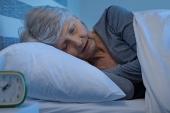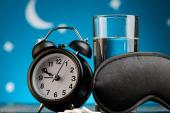New BedMed Data Confirm Antihypertensives Can Be Taken Any Time of Day
Results from BedMed and BedMed-Frail, as well as a meta-analysis, are consistent with what was seen in the TIME trial.

Taking antihypertension medications at bedtime does not seem to increase their effectiveness, Canadian findings once again show.
The new data from BedMed and BedMed-Frail, as well as a systematic review and meta-analysis of all of the currently available studies in this space, are in line with those of the earlier TIME trial, which showed no cardiovascular benefit to nighttime versus morning dosing of these drugs in more than 19,000 patients in the United Kingdom. That is at odds, though, with prior research from both the MAPEC and Hygia Chronotherapy trials suggesting 61% and 45% reductions in adverse cardiovascular events, respectively, with nighttime dosing.
“The thinking was blood pressure pills don't act for 24 hours; they're a little more active, most of them, in the early hours after you've taken it. Might there be an advantage to take your blood pressure pills at bedtime?” said Scott Garrison, MD, PhD (University of Alberta, Edmonton, Canada), who presented the BedMed and BedMed-Frail data today at the European Society of Cardiology (ESC) Congress 2024. However, “there was no harm from taking blood pressure pills at that time in either of those groups, but neither was there any suggestion of benefit.”
This means physicians “don't really need to keep thinking about promoting bedtime blood pressure medications,” Garrison said at an ESC media briefing. For patients who “have a particular reason to want to take them at a particular time, you're the best person to make the judgment of when you should take them.”
Ricky Turgeon, PharmD (St. Paul’s Hospital, Vancouver, Canada), who presented the meta-analysis, agreed. “The message is really that in terms of advising and prescribing once-a-day medications for blood pressure, patients can take them at whichever time best suits their preferences and their schedule and routine,” he said in the press conference, adding that adherence is generally better when patients take medications in the morning. “Do a different time of day if that better fits your routine, and I'll note that some medications used for blood pressure control may cause adverse events that can be eliminated by taking them in the morning or vice versa at bedtime.”
Consistent Findings
The BedMed trial enrolled 3,357 hypertensive patients treated throughout Canada by 436 primary care providers between March 2017 and December 2023. The BedMed-Frail trial enrolled 776 continuing care residents in Alberta, Canada, between May 2020 and February 2024. Both trials randomized patients to bedtime or morning BP medication use with the primary outcome of death or hospitalization for ACS, stroke, or heart failure.
There were no signs of either benefit or harm with bedtime antihypertensive use in both the BedMed (HR 0.96; 95% CI 0.77-1.19) and BedMed-Frail populations (HR 0.88; 95% CI 0.71-1.11).
Likewise, the meta-analysis which included MAPEC, Hygia, TIME, BedMed, and BedMed-Frail, also showed no benefit of evening vs morning dosing (HR 0.71; 95% CI 0.43-1.16).
Across the board, there were no differences in unplanned hospitalizations or emergency department visits, fractures, glaucoma events, or cognitive events.
In terms of advising and prescribing once-a-day medications for blood pressure, patients can take them at whichever time best suits their preferences and their schedule and routine. Ricky Turgeon
Notably, the systematic review designated both the MAPEC and Hygia trials as having higher risk of bias, which is not a “smoking gun that says this trial is flawed,” Turgeon clarified. With Hygia, he explained, “there's not enough detail in either the presentation or any of the publications of the trial to truly be confident that the trial was appropriately randomized.” Several concerns were noted for the MAPEC trial related to insufficient reporting and “not really knowing some of the critical design elements that we need to know to be confident about the results of the study,” Turgeon said.
An analysis of the three remaining trials deemed to have a low risk of bias confirmed no benefit with bedtime dosing (HR 0.94; 95% CI 0.86-1.03).
“To me, this story is put to bed from the trials that are out there now,” Turgeon told TCTMD. “I don't think that any there's anybody who would want to fund another trial that would have to be as large as TIME or Hygia to move the needle.”
Some Pushback
Yet Ramon C. Hermida, PhD (University of Vigo, Spain), who led both the MAPEC and Hygia trials, told TCTMD that there are “extremely different” protocols with the newer studies, which makes it like “comparing oranges and apples.”
For instance, Hygia required hypertension to be confirmed by ambulatory blood pressure monitoring whereas TIME and the BedMed trials did not, he said. “There are no follow-up blood pressure measurements, at least none that were described in the protocol, to ensure that the treatment impacted either blood pressure during the day or, more specifically, blood pressure during sleep.”
Because of this, as well as the “absolutely inadequate” sample size of BedMed and low compliance reported in TIME, “the question remains to which extent the results are valid or not,” Hermida argued.
All of this hasn’t led Hermida to recommend nighttime dosing for all patients taking antihypertensives, but rather mostly for those with hypertension as defined as those who have “elevated blood pressure during sleep or disrupted circadian pattern in blood pressure,” he said.
When asked why the findings between the first two trials and the most recent three have been so stark, Garrison said he’s admittedly biased, but added: “It's going to be important to take a very close look at the methods of all of the trials in the space.”
In my mind, I do believe the balance of the evidence is that timing doesn't matter. Scott Garrison
To TCTMD, John McEvoy, MBBCh (University of Galway, Ireland), said he was “comforted” to see that the new data are “consistent with my own feelings on this question.”
He specifically called out the Hygia trial as “an outlier” that “hasn’t stood up well to rebuttal and scrutiny,” and said the question of whether bedtime dosing is more effective than morning dosing in terms of preventing cardiovascular events “has been largely settled.”
“There are some patients where I actually do consider nighttime dosing on a case-by-case basis for various reasons, symptoms, type of blood pressure meds on, [and] their 24-hour profile,” McEvoy acknowledged.
Garrison agreed that the matter is resolved. “I can tell you that there are no other studies coming, that are underway at least,” he told TCTMD. “And in my mind, I do believe the balance of the evidence is that timing doesn't matter and I think that that's what you'll see reflected in the guidelines.”
The 2024 ESC guidelines for hypertension, released this week, emphasize convenience over timing. “Current evidence does not show benefit of diurnal timing of BP-lowering drug administration on major CVD outcomes,” the document notes. “It is important that medication is taken at the most convenient time of day to improve adherence. Patients should also be encouraged to take medications at the same time each day and in a consistent setting, to help ensure adherence.”
Yael L. Maxwell is Senior Medical Journalist for TCTMD and Section Editor of TCTMD's Fellows Forum. She served as the inaugural…
Read Full BioSources
Turgeon R. Meta-analysis of trials of antihypertensive medication bedtime dosing including individual-patient data from BedMed and BedMed-Frail. Presented at: ESC 2024. August 31, 2024. London, England.
Garrison S. BedMed & BedMed-Frail: Does the timing of blood pressure medication really matter? Presented at: ESC 2024. August 31, 2024. London, England.
Disclosures
- BedMed and BedMed-Frail were funded by Alberta Innovates and the Canadian Institutes of Health Research.
- Garrison, Turgeon, and Hermida report no relevant conflicts of interest.






Comments